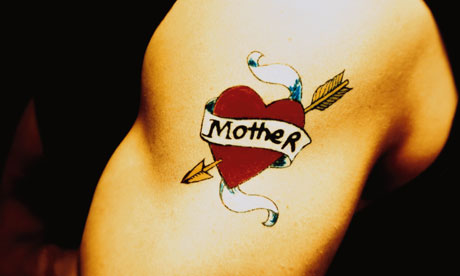Nadine Stewart was convinced she was going to die. Just ten minutes after setting off for a pop concert with her sister, she felt a tingling sensation in her arms and pain in her chest.
‘I knew I was having a heart attack,’ says Nadine, 41, a customer services adviser from Morecambe, Lancashire. ‘I begged my sister to take me to A&E: I ran in and screamed that I was having a heart attack.
‘They put me on a monitor and my heart was fine — what I had suffered was a panic attack. I have no idea to this day what caused it, but it terrified the life out of me.’

Nadine Stewart has to do everything nine times or fears her husband will die
But worse was to come. ‘Afterwards, I developed a fear that if I didn’t do something nine times, something terrible would happen to me, my husband Paul or a member of my family.’ says Nadine.
‘If I made a drink I had to stir it nine times. If I locked the door I had to check it nine times and if I used a cloth to wipe a surface I’d have to wipe it nine times. I don’t know why it was nine. I realised I was being utterly irrational. But every time I tried to curb it — such as only stirring my drink three times — I’d begin to panic.'
Nadine had Obsessive Compulsive Disorder (OCD), recognised by the World Health Organisation as one of the top ten most disabling disorders in terms of its effect on quality of life.
Last month both the British actress Emily Blunt and the MP Charles Walker revealed they suffered from it, with Walker admitting he had to do everything in multiples of four — and felt the need to wash his hands hundreds of times a day.
Surveys estimate that fewer than
10 per cent of those suffering OCD are currently receiving treatment.
They are not alone. Around a million people in the UK are thought to be undergoing treatment for OCD, the majority of them women. Women are twice as likely as men to develop anxiety disorders such as OCD — and high-achieving perfectionists are particularly at risk.
‘There are two parts to OCD, the obsession and the compulsion,’ explains Joel Rose, of charity OCD Action. ‘The obsession is a thought that pops into your head, about harm coming to someone you love or you causing harm to someone.'
‘Everyone has these thoughts but most of us ignore them and get on with our lives. Someone with OCD will develop a compulsive ritual as a reaction to them. It can be continually washing their hands or something invisible like repeating the same phrase over and over in their heads.'
‘The time spent on these compulsions lengthens with time. A severe OCD sufferer might spend six or seven hours a day washing their hands in the hope nothing terrible happens to their children.’
The cause of the condition is not known, though a stressful event in someone’s life may trigger an underlying problem.
Nadine has never pinpointed the root of her troubles — though they began in the year she started a new job, moved house and got engaged. ‘I had no reason to feel anxious,’ she said, ‘though I suppose there was a lot of change.
‘I became scared of choking to death so I stopped eating and lost three stone in less than three months. I couldn’t leave the house without Paul, and even then it would take me three hours to pluck up the courage.’
Someone who can empathise with Nadine is Jeni Scott, 31, who’s had OCD for three years.
It began when her father had a heart attack and her mother was diagnosed with cancer, soon after Jeni left university.
‘I became obsessed with doing things in order,’ says Jeni, a tutor from Newport, Wales. ‘I started making lists but it had everything on it such as “get up, have shower, make a cup of tea” and if I didn’t stick to it I would punish myself by denying myself a treat.

Actress Emily Blunt, star of Five Year Engagement, has revealed she suffers from OCD
‘I developed a phobia of being in the rain in the wrong clothes and had to take a backpack with spare bra, pants, coat, shoes and umbrella everywhere with me. I’d carry antibacterial gel in my bag and use it every ten minutes. I’ve still no idea why I did it, I just found it helped me.’
Aisha Faisal, from Reading, Berkshire, also suffers from OCD — and it’s getting worse. ‘I developed it in my teens when my mother fell ill and I had to clean the house,’ the 26-year-old says. ‘Now I’m obsessed with everything being super-clean. I wash my hands 14 or 15 times a day, I shower for an hour at a time and wash the shower head and bath thoroughly before I step in.
‘If someone touches me, I cringe. My neighbour touched my scarf to tell me it was pretty and I had to have a shower and put all my clothes in the wash.’ Aisha, who has three children under four, admits her obsession extended to giving birth.
‘Each time I had Caesarean sections — the thought of having a natural birth makes me feel physically sick.’ She made the surgeons assure her everything had been scrubbed thoroughly before each operation. Understandably, her OCD worries the rest of her family. ‘My husband Ali finds it very hard to see me like this. I won’t let him touch me when he comes in from work: he has to shower and put on clean clothes before he can hug me.'
‘With three young children, being clean is impossible and I bathe them twice a day in the winter and sometimes four times a day in the summer if they’re hot and sticky.’
As a result of her obsession her own hands are red raw and she suffers from eczema. ‘I have been to the GP but it’s very difficult to treat. I know I must do something soon, because my eldest daughter, who is four, is picking up on my behaviour and I feel very guilty about that.'
‘The other day she came in from the garden and said she was dirty so needed to get out of her clothes and I washed her and cleaned her thoroughly. My husband can’t believe our electricity bill because the washing machine is on constantly.’
While Aisha is still in the grip of OCD, Jeni and Nadine have overcome the condition. According to the NHS, the two recognised forms of treatment are Cognitive Behaviour Therapy (CBT), which helped Jeni, and anti-depressants.
But Nadine used another therapy called The Linden Method — a two-day workshop costs £995 — when she reached her lowest point early last year.
‘I was unable to work, leave the house or answer the phone,’ she says. ‘My vision became blurry, my hands would spasm and I’d get pains like rheumatism. I began to think: “What’s the point in living?” yet I was too scared to kill myself.’
The Linden Method — which has also helped OCD sufferers Jemma and Jodie Kidd — works by convincing the sufferer’s sub-conscious that they are safe.
‘I’m a different person,’ says Nadine. ‘I can leave the house, I’m applying for jobs, taking up hobbies and it’s transformed my relationship with Paul.
‘He says it’s like having a wife in a wheelchair who can walk again. Except I feel I can not only walk, I can fly.’












